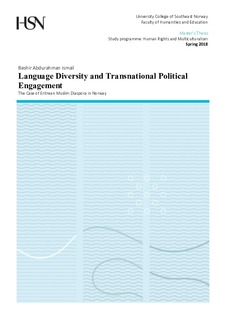Language Diversity and Transnational Political Engagement The Case of Eritrean Muslim Diaspora in Norway
Master thesis
Permanent lenke
http://hdl.handle.net/11250/2560978Utgivelsesdato
2018Metadata
Vis full innførselSamlinger
Sammendrag
This thesis examines the role of language diversity in the diasporic political engagement of Eritrean Muslim non-Tigrigna speakers and Tigrigna speakers in Norway. It attempts to explore the interplay of language in the realization of collective transnational political movement that seeks democratization and political reform in Eritrea. To grasp a broader understanding of the influence of language in the diaspora Eritrean politics, the thesis seeks to critically analyze the post-independence language policy that was adopted by the Eritrean government and highlight its implications in the inter-Eritrean diaspora socio-political engagement. As a methodology, a qualitative strategy with semi-structured interviewing was used. The results indicate that the post-independence language policy in Eritrea was designed to legitimize Tigrigna language domination and conversely, to promote the fragmentation of Eritrean Muslims along linguistic lines. The homeland-originated language policy also has cross-border implications for the non-Tigrigna speakers which have neither learned in Tigrigna nor the Arabic language – the political debate in the diaspora is mainly conducted in Arabic, Tigrigna, and English. Hence, the policy has perpetuated their disengagement and exclusion from collective political engagement in Norway. Having said that, linguistic barriers that exist among the Eritrean diaspora are not the sole factors that undermine the possibility of a united transnational political engagement. There are other multifaceted underlying elements, including the behavior of the Eritrean government towards the minorities; mistrust; lack of solidarity and democratic culture; non-recognitions of other’s rights; intolerance; and long-distance surveillance undertaken by the agents of the Eritrean regime in the diaspora.
